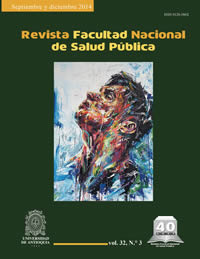Editorial
DOI:
https://doi.org/10.17533/udea.rfnsp.20630Abstract
En el tiempo en que este editorial se escribe, la población colombiana asiste a unos debates acompañados de gran despliegue en los medios masivos de comunicación, relacionados con la aplicación de la vacuna contra el Virus del Papiloma Humano (vph) en mujeres adolescentes de una región del país. Se trata de la aparición en un municipio de la costa atlántica de algunos síntomas en las niñas a quienes previamente se les aplicó la vacuna. La comunidad desde su propia visión, asocia de inmediato estos dos eventos, y con la participación de los medios masivos de comunicación, en especial de los noticieros nacionales de televisión, se irriga la idea de que la vacuna es la causante de los episodios de desmayos y otras molestias de la niñas y por ende se provoca una reacción ciudadana en contra de los programas de vacunación provistos por el Estado. El Ministerio de Salud por su parte entra en el debate con afirmaciones que defienden su interés político en la vacunación, la cual se considera de impacto positivo sobre la salud de las poblaciones, por su capacidad de disminuir la incidencia del cáncer de cuello uterino, y se acompaña de argumentos que refuerzan la validez de los estudios científicos que evidencian la eficacia de la vacuna y los bajos índices de efectos colaterales.
Downloads
Published
How to Cite
Issue
Section
License
Copyright (c) 2021 Álvaro Olaya Peláez

This work is licensed under a Creative Commons Attribution-NonCommercial-ShareAlike 4.0 International License.
The contents of the articles are the responsibility of the authors
The editorial committee has editorial independence from the National School of Public Health "Héctor Abad Gómez" of the University of Antioquia.
The editorial committee is not responsible for aspects related to copying, plagiarism or fraud that may appear in the articles published in it.
When you are going to reproduce and disclose photographs or personal data in printed or digital format, informed consent is required. Therefore, this requirement is required of the author at the time of receipt of the manuscript.
Authors are responsible for obtaining the necessary permissions to reproduce any material protected by reproduction rights.
The authors preserve the moral rights and assign the economic rights that will correspond to the University of Antioquia, to publish it, distribute electronic copies, include them in indexing services, directories or national and international databases in Open Access, under the Creative Commons Attribution license -Not Commercial-Share Equal 4.0 International Commercial (CC BY-NC-SA) which allows others to distribute, remix, retouch, and create from the work in a non-commercial way, as long as the respective credit and license are granted. new creations under the same conditions.
The authors will sign the declaration of transfer of economic rights to the University of Antioquia, after the acceptance of the manuscript.
The editorial committee reserves the right to reject the articles whose authors do not offer satisfactory explanations about the contribution of each author, to meet the criteria of authorship in the submission letter. All authors must meet the four criteria of authorship according to ICMJE: "a) .- That there is a substantial contribution to the conception or design of the article or to the acquisition, analysis or interpretation of the data. b) That they have participated in the design of the research work or in the critical review of its intellectual content. c) .- That has been intervened in the approval of the final version that will be published.d). That they have the capacity to respond to all aspects of the article in order to ensure that issues related to the accuracy or integrity of any part of the work are adequately investigated and resolved. "












 --
--  --
--
